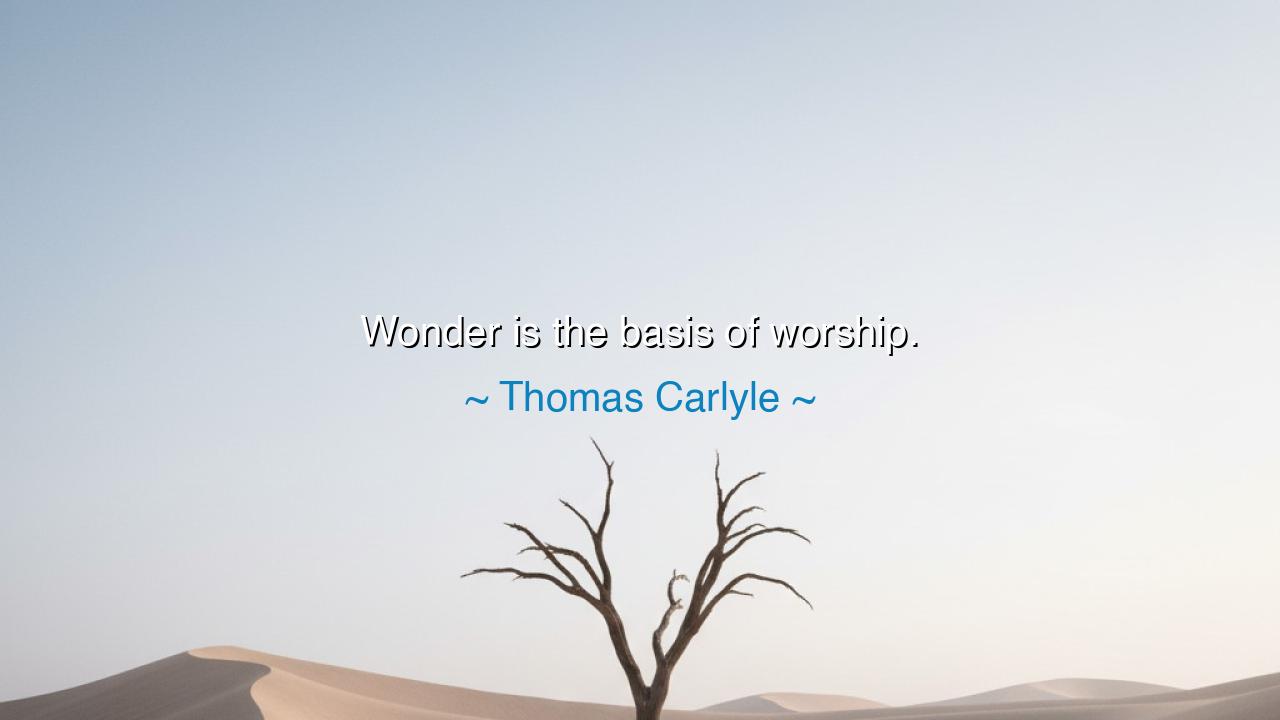
Wonder is the basis of worship.






“Wonder is the basis of worship,” wrote Thomas Carlyle, the fiery prophet of the nineteenth century, whose words often blazed like torches against the dimness of material thought. In this simple yet profound truth, Carlyle reveals the seed from which all reverence, all religion, all awe of the divine has sprung. For before there were temples, before there were creeds, before mankind named its gods, there was wonder — that holy astonishment which rises in the heart when it beholds the mystery of existence. It is wonder that awakens the soul from its sleep of indifference; it is wonder that makes man lift his eyes to heaven and whisper, “Who made this?”
The origin of this quote lies in Carlyle’s work Sartor Resartus (1836), a strange and powerful book that sought to strip away the outer garments of custom and reveal the spirit beneath. Carlyle saw that the modern world, drunk on reason and progress, had forgotten the sacred power of awe. He lamented that men had learned to measure the stars but no longer felt their majesty. Thus he proclaimed: wonder is not childish ignorance, but the beginning of wisdom — it is the door through which the human soul steps into the eternal. Worship, he said, does not begin with doctrine or ritual; it begins when a man, standing before the vastness of the universe, feels small, yet beloved, and knows that something greater than himself moves all things.
To wonder is to see the world not as common, but as miraculous. It is to look upon the morning sun and feel gratitude instead of boredom; to hear the rustle of the leaves and sense the pulse of the divine behind their trembling. From this wonder springs worship, not as obligation, but as overflowing joy — the soul’s natural response to beauty and mystery. All the great faiths of the earth were born from such moments: from shepherds gazing at the night sky, from prophets listening to the voice in the wind, from poets and philosophers who felt the heartbeat of God in the order of creation. Without wonder, worship is empty; but where wonder lives, even silence becomes prayer.
History gives us luminous examples of this truth. Consider Isaac Newton, the man who unraveled the laws of gravity and motion. Though he was a man of science, his heart was that of a worshiper. When asked how he discovered such universal laws, he answered humbly, “By thinking continually of them.” Yet Newton was not driven by ambition alone — he was driven by wonder. He saw in the motion of the planets the hand of the Creator. For him, each revelation of truth was a glimpse into the divine order, and every question led him nearer to God. His science was worship; his curiosity, prayer. Thus Carlyle’s words echo through his life: for where wonder dwells, reverence is born.
Carlyle’s insight also reminds us of the tragedy of a world that loses its capacity for awe. When the heart grows hardened by cynicism, when the eyes see nothing but utility, when the spirit is dulled by noise and haste, worship dies. The modern mind, he warned, is in danger of knowing everything yet believing in nothing. A man may walk beneath the stars and think only of distance, not of beauty; he may dissect a flower and forget its fragrance. But worship — true, living worship — begins when we stop to marvel again. When the heart bows not from fear, but from love and astonishment at the mystery that breathes through all things.
This teaching, though ancient in essence, is as urgent today as it was in Carlyle’s time. For our age, full of knowledge and empty of reverence, must learn again to wonder — to look upon the world as a miracle, not a machine. It is not necessary to enter a church to worship; one need only open the eyes of the soul. Watch a child discovering the ocean for the first time — that gaze of awe, that breathless joy — there lies the first spark of worship. In such moments, the divine reveals itself, not as a distant ruler, but as the living mystery of existence, calling the heart to praise without words.
So, dear listener, what lesson shall we draw from Carlyle’s immortal insight? It is this: guard your sense of wonder, for it is the doorway to the sacred. When you lose your ability to marvel, you lose your connection to the divine. Look upon the world not as mundane, but as miraculous. See the hand of eternity in every sunrise, the echo of heaven in every heartbeat. Let gratitude, not familiarity, shape your gaze. Worship does not demand temples or hymns — it demands a heart awakened to wonder.
For in the end, Carlyle reminds us that wonder is not the child of faith — it is its mother. From wonder comes reverence; from reverence, gratitude; and from gratitude, love. To live without wonder is to walk through paradise blind. But to live with wonder — to kneel in awe before life’s mystery — is to worship, not only with words, but with one’s very being. And thus the soul, in its humility and amazement, finds its true home in the infinite.






AAdministratorAdministrator
Welcome, honored guests. Please leave a comment, we will respond soon